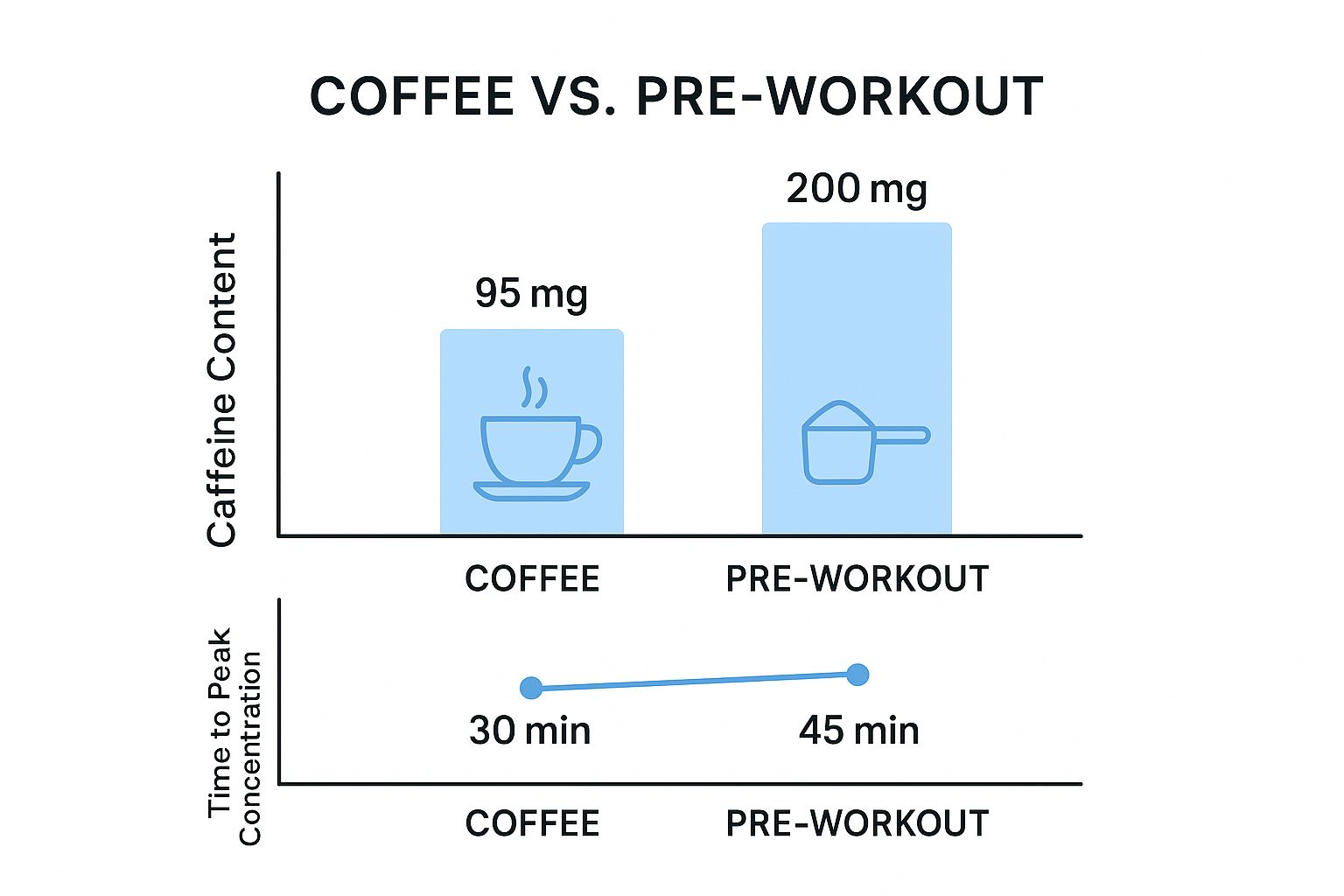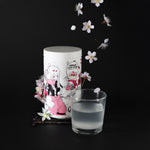Trying to decide between a scoop of pre-workout and a simple cup of coffee before hitting the gym? It's a classic crossroads for anyone serious about their training, whether you're a casual lifter or aiming to reach your ultimate anime hero form. Here's the bottom line: if you're chasing peak performance—think bigger pumps, better endurance, and more strength for those high-intensity sessions—a well-formulated pre-workout is engineered specifically for that. But if you just need a clean, reliable energy and focus boost for moderate training or a long cardio session, coffee is a fantastic, natural choice.
Choosing Your Power-Up
Picking your pre-training fuel is a huge part of setting yourself up for a great workout. The whole pre-workout vs. coffee debate really boils down to your specific fitness goals, how hard you plan on training, and frankly, how your own body reacts to different ingredients. This isn't just about getting a quick jolt of energy like a Super Saiyan transformation; it's about giving your body the right tools for the job you're about to ask it to do.
A pre-workout is a complex dietary supplement, packed with multiple ingredients designed to boost athletic performance from several angles. Coffee, on the other hand, is nature's stimulant, relying almost entirely on caffeine to get you going. While they both get you energized and focused, the way they work and the extra benefits they offer are worlds apart.
Pre-Workout vs Coffee At a Glance
To really get to the heart of the matter, a side-by-side look is the best way to see the core differences. Pre-workouts are built to trigger specific physiological responses, like increasing blood flow for a better pump or fighting off fatigue so you can push out more reps. Coffee offers a more straightforward stimulant effect.
This table breaks down the key attributes to give you a quick snapshot of where each one shines.
| Feature | Pre-Workout Supplement | Coffee |
|---|---|---|
| Primary Goal | Targeted performance enhancement | General energy and alertness |
| Key Ingredients | Caffeine, Beta-Alanine, L-Citrulline, Creatine | Caffeine, antioxidants, polyphenols |
| Best For | Intense strength training, bodybuilding, HIIT | Steady-state cardio, moderate workouts, focus |
| Primary Effect | Increased power, endurance, muscle pump | Heightened focus, reduced perceived effort |
These distinctions are especially important for anyone just starting their fitness journey. If you're new to the world of supplements, diving into a good pre workout for beginners guide can give you the rundown on what all those ingredients actually do and how to use them properly. It's all about making sure your choice lines up with your goals from day one.

As you can see, pre-workouts often pack a more potent caffeine punch and can take a little longer to fully kick in compared to your standard cup of joe. This is something to keep in mind when you're timing your pre-gym ritual.
Deconstructing the Formulas Behind the Boost

To really settle the pre-workout vs. coffee debate, we have to look past the jolt of energy and get into what you’re actually drinking. Pre-workout supplements are complex, engineered formulas. Think of them as a tactical toolkit designed to get specific results from your body, much like an anime character unlocking a new ability. They are so much more than just a scoop of caffeine.
On the flip side, coffee's strength is its pure, natural simplicity. It's a single-ingredient beast that gives you a clean lift along with some solid health perks. The difference is pretty clear: pre-workouts are built for targeted athletic performance, while coffee is a more straightforward, natural energy source. That distinction is what will make or break your training session.
The Engineered Pre-Workout Formula
A good pre-workout is all about synergy. Each ingredient has a job to do, and they all work together to improve your workout from different angles. It’s like assembling a team of elite warriors where each member has a unique skill.
Here are a few of the heavy hitters you’ll almost always find in the mix:
- Beta-Alanine: This is the stuff that gives you that tingly feeling. But its real job is to help buffer lactic acid in your muscles. That means less muscle fatigue, letting you grind out those last few reps that really count.
- L-Citrulline: Ever heard of "the pump?" This is a key player. L-Citrulline boosts nitric oxide, which widens your blood vessels. The result? Better blood flow, which shuttles more oxygen and nutrients straight to your muscles when they need it most.
- Creatine: As one of the most studied supplements on the planet, creatine is all about power. It helps your muscles generate energy for heavy lifts and explosive movements, directly boosting your strength output.
These aren't just thrown in randomly; they're chosen to work together to smash through workout plateaus, from endurance to raw power.
The real edge of a pre-workout is this multi-pronged attack. It's not just waking you up; it’s prepping your muscles for the stress of a tough session by boosting endurance, power, and blood flow all at once.
The Natural Power of Coffee
Coffee’s primary weapon is, of course, caffeine. But there’s more to it than just a stimulant buzz. A good cup of black coffee is also loaded with antioxidants and polyphenols. These little compounds help fight off oxidative stress and contribute to your long-term health—a nice bonus for any athlete.
The caffeine in your coffee gets to work by blocking adenosine, the neurotransmitter that makes you feel tired. This gives you a clean, effective spike in alertness and focus. It’s a simple, proven mechanism that has made coffee a go-to pre-training ritual for decades.
When you put them head-to-head, the caffeine content is a major difference. Pre-workout powders can pack anywhere from 150mg to over 300mg of caffeine per serving. That often dwarfs the average 95mg you’ll find in a standard 8-ounce cup of coffee. You can dive deeper into pre-workout industry trends to see just how potent these formulas are getting.
How They Actually Impact Your Performance

Alright, enough with the theory. When it's time to actually get under the bar or hit the pavement, how do these two really stack up? This is where the rubber meets the road. The choice you make—pre-workout or coffee—directly shapes your training session, influencing everything from raw power to how long you can last.
A good pre-workout is designed for a full-body assault. Its formula is engineered to do more than just wake you up; it's there to prime your muscles for the work ahead. Coffee, on the other hand, gives you a cleaner, more mental boost that's perfect for a different kind of grind.
For Powerlifting and Pushing Heavy Weight
Picture a powerlifter psyching themselves up for a one-rep max attempt on the deadlift. They need a burst of explosive power, the strength to grind through multiple heavy sets, and the mental fortitude to break through barriers. This is exactly where a multi-ingredient pre-workout earns its keep.
The combination of ingredients like L-Citrulline for blood flow and Beta-Alanine to fight off fatigue gives you a real, tangible edge. Better blood flow creates that "pump," which isn't just about looking bigger in the mirror; it means your muscles are getting fed the oxygen and nutrients they need to perform.
For a strength athlete, taking pre-workout is like hitting a power-up. You're not just looking for energy—you're trying to maximize force production and push back muscle failure to grind out every last rep. That's what builds serious strength.
For Endurance and High-Volume Workouts
Now, let's flip the script. Think about a runner gearing up for a 10-miler or a CrossFitter staring down a grueling, high-volume WOD. Their main goal is sustained energy and focus over a long haul, without any intense physical distractions getting in the way.
This is where a simple cup of coffee really shines. The caffeine gives you that clean jolt of alertness and has been proven to lower your perception of effort, which can make a long, tough workout feel way more manageable. In fact, one study showed that athletes who had caffeine before their workout burned about 15% more calories for three hours afterward compared to those who didn't.
Coffee provides a steady stream of focus without the skin-tingling sensation from Beta-Alanine or the sometimes distracting muscle pump from other ingredients. This lets the endurance athlete stay in the zone, concentrating on their pace and form.
Here’s a quick breakdown of how they compare for different training styles:
- Power and Explosiveness: Pre-workout wins here. Ingredients like creatine and nitric oxide boosters are built for the short, intense efforts needed for heavy lifting.
- Muscular Endurance: The Beta-Alanine in most pre-workouts helps you fight off that burning sensation, letting you push for more reps in that 8-12 range, which is key for muscle growth.
- Sustained Cardio: Coffee is the better pick. It offers a smoother energy lift that’s perfect for keeping a steady pace on a run, bike ride, or any other long-duration activity.
- Mental Clarity: Both deliver, but coffee’s straightforward stimulant effect provides a clean, clear focus that’s ideal for workouts that demand concentration without the extra physical side effects.
Timing, Cost, and Convenience
Let's get practical. Beyond the ingredients and performance benefits, the real decider often comes down to timing, cost, and convenience. The best pre-training fuel is the one you can actually stick with, so how does each option fit into your real life?
Timing is everything when you're trying to maximize your energy for a workout. Pre-workouts are engineered for speed, hitting your system fast. Coffee, being a natural brew, takes a little more time to kick in.
The Ideal Time to Drink Up
Nailing the timing ensures you feel that peak energy right as you grab the weights for your first set.
For most pre-workouts, the sweet spot is taking it 20-30 minutes before you start. This gives powerful ingredients like Beta-Alanine and L-Citrulline enough time to get to work.
Coffee, on the other hand, needs a bit more of a head start. You’ll want to finish your cup about 30-45 minutes before your workout. This lets the caffeine hit its peak concentration in your bloodstream just when you need that clean focus. Getting this right is a game-changer, and you can learn more about when to take pre workout to perfectly sync it with your schedule.
Cost Breakdown: Per Serving
Money talks. A tub of a specialized supplement might seem pricey at first, but let’s break down the cost per workout.
- Pre-Workout: A typical tub gives you 30 servings for around $40. That comes out to about $1.33 per workout.
- Home-Brewed Coffee: A good bag of beans can make 30 cups for about $15, making it just $0.50 per serving.
- Café-Bought Coffee: Grabbing a cup on the go is the most expensive route, easily running you $3.00 to $5.00 a pop.
While brewing at home is clearly the cheapest, a pre-workout offers a whole complex of performance-boosting ingredients for a pretty reasonable price. It's a lot more value than just a caffeine buzz.
The Convenience Factor
Finally, let's talk about what's easiest. Consistency is built on convenience.
Pre-workout powders are made for the gym lifestyle. They're portable, mix instantly with water, and require zero brewing. Just toss a scoop in your shaker and you're good to go, anywhere, anytime.
Coffee is available almost everywhere, but making it yourself takes time and effort. For those early morning sessions or when you're rushing to the gym after work, the simple mix-and-go nature of a pre-workout usually comes out on top. It really boils down to what you value more: the ritual of a warm cup of coffee or the grab-and-go efficiency of a dedicated supplement.
Understanding Potential Side Effects and Risks
Whether you’re team pre-workout or team coffee, it’s crucial to know what you’re getting into. Both have potential downsides if you’re not careful, and understanding the risks helps you make a choice that supports your long-term health, not just your next PR.
When it comes to the pre-workout vs. coffee debate, side effects are a huge part of the conversation.
Common Pre-Workout Side Effects
Pre-workout formulas are packed with a ton of different ingredients, and some of them can cause some… interesting physical sensations. That’s not necessarily a bad thing, but you need to be aware of what’s happening.
The most famous one is that tingly feeling, technically called paresthesia. It’s caused by Beta-Alanine, the ingredient that helps you fight off that muscle burn. It might feel a little weird at first, but it's a completely normal reaction and usually fades once you start moving.
Other things to watch out for include:
- Jitters and Anxiety: High doses of stimulants, especially caffeine, can leave you feeling jumpy or on edge if you have a low tolerance.
- Digestive Upset: Some ingredients can cause bloating or an upset stomach. It’s always smart to start with a half-scoop to see how your body reacts.
- Sleep Disruption: This one’s a no-brainer. Taking a high-stim pre-workout too close to bedtime will wreck your sleep and kill your recovery.
Learning how to manage these effects is key to finding the right pre-workout for you. If you want a deeper dive, you can learn all about the common pre workout side effects and how to handle them.
Risks Associated with Coffee
Coffee usually gets a pass as the "safer" choice, but its main weapon—caffeine—has its own set of risks, especially if you’re drinking a lot of it every single day.
The biggest issue is the potential for caffeine dependency. Over time, your body builds a tolerance, and you start needing more and more just to feel normal. It’s a tough cycle to break.
The simplicity of coffee is its greatest strength, but it's also its biggest risk. Because it's so easy to grab another cup, it's also easy to overdo it. That can lead to heightened anxiety, messed-up sleep patterns, and even adrenal fatigue from being constantly stimulated.
With either option, the smart move is to listen to your body and take breaks from stimulants every so often. Cycling off helps reset your tolerance, keeps your pre-workout effective, and gives your adrenal system a break. It's clear that people are seeking that extra edge, with the global pre-workout market projected to hit a massive USD 44.7 billion by 2035. This boom just underscores how important it is to use these powerful products wisely. You can explore more on this market expansion to see why being an informed consumer matters more than ever.
So, Which One Should You Choose?
When it comes to the pre-workout vs. coffee debate, the final call really hinges on your personal goals and what you're trying to accomplish in the gym. There's no single "best" answer here, just the right tool for the job. Your choice should line up with how hard you're training, the results you're chasing, and frankly, how your own body reacts.
Think of it like picking a special move in a video game—you grab the power-up that gives you the best edge for the challenge ahead. Each one offers a different kind of boost, built for a specific style of performance.
Go for Pre-Workout When You Need Max Performance
If you're all about squeezing every last drop out of every single rep, getting a nasty pump, and pushing your strength to its absolute limit, a solid pre-workout is the obvious choice. The combination of ingredients like L-Citrulline and Beta-Alanine is specifically designed for high-octane training, delivering benefits that a simple cup of coffee just can't touch.
This is the go-to for:
- Bodybuilders and lifters trying to maximize muscle pumps and raw power.
- HIIT fanatics who need to fight off muscle burn during those killer intervals.
- Anyone stuck on a plateau and trying to smash through it.
Stick with Coffee for Clean Energy and Endurance
On the flip side, if you just need a reliable, clean energy lift for some steady-state cardio or a moderately tough workout, coffee is a fantastic option. It gives you a smooth, effective jolt of focus and alertness without all the other physiological bells and whistles of a complex pre-workout formula.
Coffee is a perfect match for:
- Runners, cyclists, and other endurance athletes who need that energy to last.
- Casual gym-goers who just want a simple, natural boost to get them going.
- Morning workout warriors who love the ritual and mental clarity that comes with a fresh cup.
The decision is all about context. If you're chasing new personal records in strength and size, a pre-workout is the superior tool for the job. But for reliable energy and focus during moderate or endurance-focused training, coffee is a simple, effective ally.
The demand for that competitive edge has skyrocketed, especially in North America, which dominates the supplement market. With more people hitting the gym than ever before, the desire for products that can enhance training sessions has never been higher, creating a huge market for specialized fitness supplements.
Got Questions? We've Got Answers
Still weighing your options between pre-workout and coffee? You're not alone. Here are some of the most common questions that come up when deciding on the right fuel for your workout.
Can I Mix Pre-Workout and Coffee?
That’s a hard no from us. Stacking these two is asking for trouble.
Most pre-workouts are already packing a serious punch of caffeine, usually somewhere between 150-300 mg. Tossing a cup of coffee on top of that can easily shove you past the 400 mg daily safe limit. The result? A one-way ticket to jitters, anxiety, and a heart-thumping experience you didn't sign up for. Pick one and stick with it.
Which One Lasts Longer?
Pre-workout usually has a longer-lasting impact, with effects sticking around for 3 to 6 hours. That initial rush you feel will fade, but the performance benefits from ingredients like Beta-Alanine and L-Citrulline are designed for endurance.
Coffee, on the other hand, gives you a more focused boost that typically lasts for about 3 to 5 hours. It's a solid burst of energy, just without the same sustained physical performance edge you get from a dedicated pre-workout formula.
Is Coffee a Good Pre-Workout if I’m Trying to Lose Weight?
Absolutely. Coffee can be a killer sidekick on a weight loss journey. The caffeine naturally revs up your metabolism and can even help your body burn more fat while you exercise.
Plus, the extra energy helps you push harder in your workouts, which means more calories burned. The key is to drink it black. Loading it up with sugar and cream will just cancel out all the good stuff.
Ready to feel a power-up inspired by your favorite anime heroes? Otaku Pump delivers a formula engineered for intense energy, sharp focus, and legendary muscle pumps. Unleash your ultimate form today!




